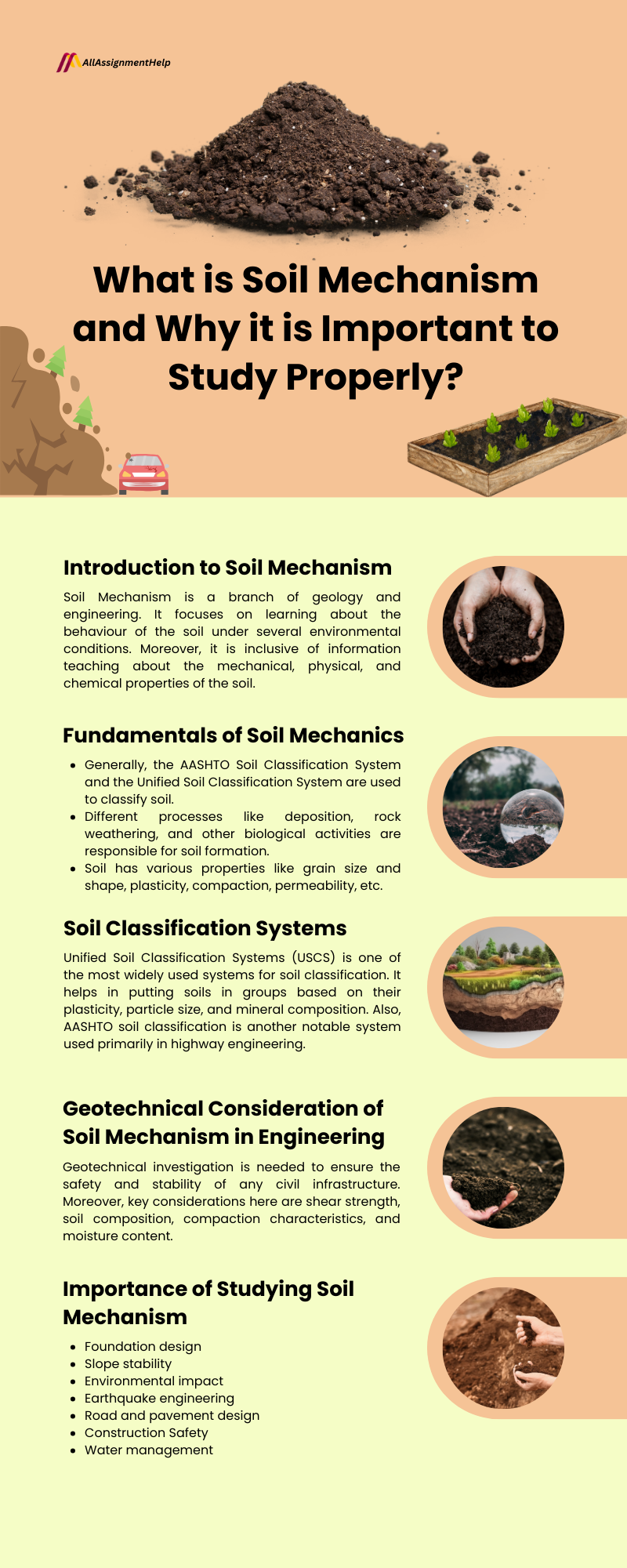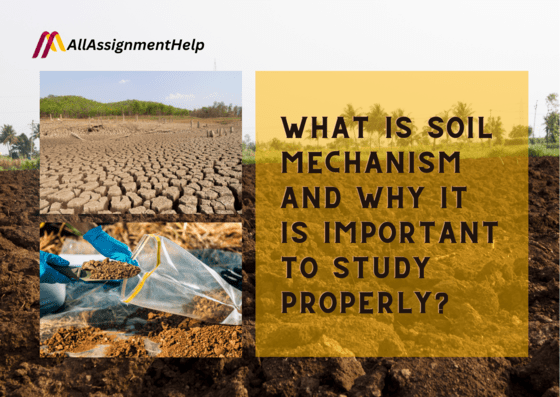We often overlook soil as it is something that is always under our feet. How many of us would have ever thought about the role it plays in sustaining life on earth? We believe not many of us unless we are associated with it through a subject discipline. All of us have read about the fundamentals of soil in our elementary classes. However, the soil mechanism is beyond the basics. It is the physical and mechanical properties of the soil underneath that are known as soil mechanism or soil mechanics.
Furthermore, it is a subject discipline as well in which we read about the behaviour of soil exposed to several conditions. Through this blog of All Assignment Help, let us delve deeper into the concept of soil mechanism and why it is important to study it properly.
Introduction to Soil Mechanism
Soil Mechanism is a branch of geology and engineering. It focuses on learning about the behaviour of the soil under several environmental conditions. Moreover, it is inclusive of information teaching about the mechanical, physical, and chemical properties of the soil. With the knowledge of these properties, we can analyze how soil responds to various forces like deformation, strain, and stress. Furthermore, the primary goal here is to know about the soil introduction, structure, and foundations. Also, to ensure the safety and stability of any infrastructure built on the soil.
Also read: Flora and Fauna: Why Is It Important for Humans?
Soil Mechanism: Fundamentals of Soil Mechanics
It is significant to understand the fundamentals of soil mechanisms for the construction and designing of civil engineering structures like embankments, slopes, etc. Given below are some of the key concepts of soil mechanics.
- Generally, the AASHTO Soil Classification System and the Unified Soil Classification System are used to classify soil as sandy, clayey, red soil, etc.
- Different processes like deposition, rock weathering, and other biological activities are responsible for soil formation. Understanding soil composition can help in the prediction of engineering properties of the soil.
- Soil has various properties like grain size and shape, plasticity, compaction, permeability, etc.
- Next comes the effective stress and pore water pressure. The stress that the soil skeleton carries is the effective stress whilst the pressure that water exerts in the soil voids is called the pore water pressure.
- Soil reduces in volume gradually due to load; this process is called consolidation.
- When the ground surface moves vertically, it is called settlement.
- The shear strength parameter is the soil’s ability to resist any type of stress and prevent deformation.
Fine points
- Slope stability is another significant fundamental of soil mechanics which is crucial to consider design safe embankments, etc. Moreover, factors like soil definition, slope angle, soil type, and groundwater conditions affect slope stability.
- In foundation engineering, bearing capacity is a crucial consideration. It means the soil’s ability to support the pressure applied to it.
- Soil exploration means investigating the soil conditions of a site through techniques like sampling, boring, etc.
As far as the theoretical knowledge of soil mechanism is concerned, you need to focus vividly on what is taught in your lectures and responsibly attempt the given assignments and other academic responsibilities. In case of any complexity with assignment writing, you can seek expert assistance from the best online coursework service available on the internet.

Soil Mechanism Classification Systems
In geotechnical engineering, soil classification systems tend to be essential tools. This is needed to categorize and characterize various soil types depending on their engineering and physical properties. Moreover, we get a standardized framework with the help of these systems so that we can organize soil systematically and communicate information related to soil. All this information helps in designing and constructing a structure. Unified Soil Classification Systems (USCS) is one of the most widely used systems for soil classification. It helps in putting soils in groups based on their plasticity, particle size, and mineral composition. Also, AASHTO soil classification is another notable system used primarily in highway engineering.
For anyone in the civil engineering field, learning about soil classification systems is paramount, including online learners. Understanding the topic in depth also enhances the educational experience of online students. Because you get to use practical tools to navigate the intricacy and complications of geotechnical engineering in the real world. However, if your continuous online lectures are hindering you from gathering practical information, you can consign an expert to take your online class for you. All you need to do is look for a legitimate service with a keyword search and post your requests, like, Take my online class. Then you have to choose an expert in the field you want and assign your class so that you can engage yourself in practical learning without worrying much about the theory content.
Geotechnical Consideration of Soil Mechanism in Engineering
If you are studying engineering, you must consider the thorough learning of geotechnical considerations. Because they are important, especially in the field of soil mechanics. As we have studied earlier, soil mechanism means studying the mechanical and physical properties of soil so that its behaviour can be understood under various conditions. Geotechnical investigation is needed to ensure the safety and stability of any civil infrastructure. Moreover, key considerations here are shear strength, soil composition, compaction characteristics, and moisture content. As an engineer, you will need all this information to design foundations that can hold up the pressure imposed by the infrastructure on the soil.
Furthermore, any potential risk can be mitigated with all this information such as slope instability, landslides, etc. In addition to this, geotechnical investigations also help in the selection of the right material for the construction, grading plans, determining excavation, and assessing potential impacts on the environment. Also, you can seek online assignment help if understanding geotechnical considerations and composing a related assignment is an intimidating task for you.
Hence, we can say that geotechnical consideration of soil mechanisms in engineering is crucial to making reasoned decisions and ensuring the longevity of the performance and safety of civil engineering projects.
Also read: A Student’s Guide to Climate Change and Wildfires
Importance of Studying Soil Mechanism
Given below are some of the major reasons why we must study soil mechanisms properly.
Foundation design
The foundation of any structure we are making, be it a bridge, dam, building, or anything, depends greatly on the soil. Therefore, as an engineer, you must understand the soil mechanics so that you can design infrastructure or foundations that can withstand any situation that across due to the environment. In this way, you can ensure the safety, longevity, and stability of the infrastructure.
Slope stability
In sloped terrains, having the right understanding of soil mechanics is needed to ensure slope stability. In order to prevent slope failures or landslides, you must know the behaviour of soil on the slopes. Earth retention systems can also be used to provide support to slopes, wing walls, etc. In this way, both the environment and infrastructure can be protected.
Environmental impact
For the protection of the environment, it is important to learn how soil interacts with contaminants. Hence, through soil mechanism, we can learn how pollutants are transported through soil. As a result, environmental engineers can design strategies that can provide effective remedies.
In the process of learning the in-depth soil mechanism, there are chances to oversee other academic obligations, such as taking your online biology class or an assignment for the same. But there is a solution for this, which is to hire an expert to meet your needs. You can ask a professional to take my online biology class. While you delegate your academic responsibilities to the experts, you will get enough time to learn everything about soil mechanics and meet your academic obligations without any hassle.
Earthquake engineering
During seismic events, the behaviour of soil is a significant aspect of soil mechanics. Moreover, with the right information and knowledge, we can design structures that can face the dynamic forces that come during an earthquake. In this way, we can minimize structural damage and save people.
Road and pavement design
We need to have good soil knowledge when we decide to construct roads and pavements. This is important to determine the right materials and road thickness. Furthermore, it will ensure durability and prevent deformation and settlement.
Construction Safety
Another reason why we must study soil mechanisms properly is to follow construction safety. There are a lot of excavations and heavy load placement on the soil that goes into construction activities. Therefore, the right knowledge is crucial for the safety of workers along with the structures made temporarily during the construction period.
Water management
Having the right knowledge of soil is also needed for water resource management. Soil dynamics also helps in reading soil permeability based on which groundwater recharge, irrigation, drainage, etc. decisions can be taken.
Conclusion
In conclusion, we learnt that soil mechanism or soil mechanics is a subject discipline that helps us understand the various environmental and engineering considerations of soil. Moreover, we cannot undermine the significance of soil mechanics as it is correlated to the stability, safety, and sustainability of the environment we built. Scientists and engineers who study soil mechanics can efficiently make informed decisions that help in the development of sustainable solutions and resilient structures. Furthermore, it is beneficial for both the environment and the human society. The more we advance in technology and come across new challenges, the deeper we will need to understand soil mechanics and how it shapes our future and makes it sustainable.
Frequently Asked Questions
| Question: What exactly is the concept of soil development? Answer: Weathering, fracturing, and comminution of rock into mineral soil particles are all processes that contribute to soil formation. These processes progress at different rates, depending on the severity of the stimuli at work. |
| Question: Why is soil mechanics important? Answer: Soil mechanics is important in civil engineering because it defines the rules governing how civil infrastructure projects such as buildings, bridges, tanks, embankments, dams, and tunnels are supported by soil. |
| Question: What is the fundamental notion of soil? Answer: Soil is a loose surface substance that covers the majority of the ground. It comprises of both inorganic and organic particles. Soil gives structural support to plants used in agriculture, as well as a source of water and nutrients. |
